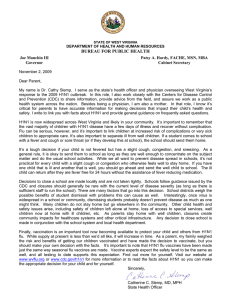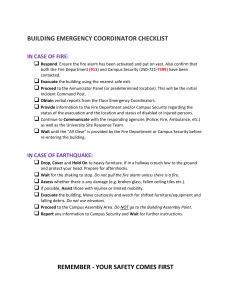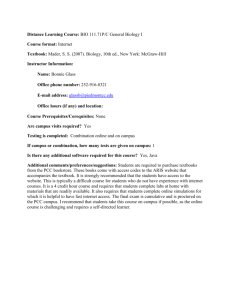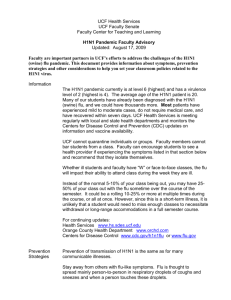Insurance Coverage for Students
advertisement
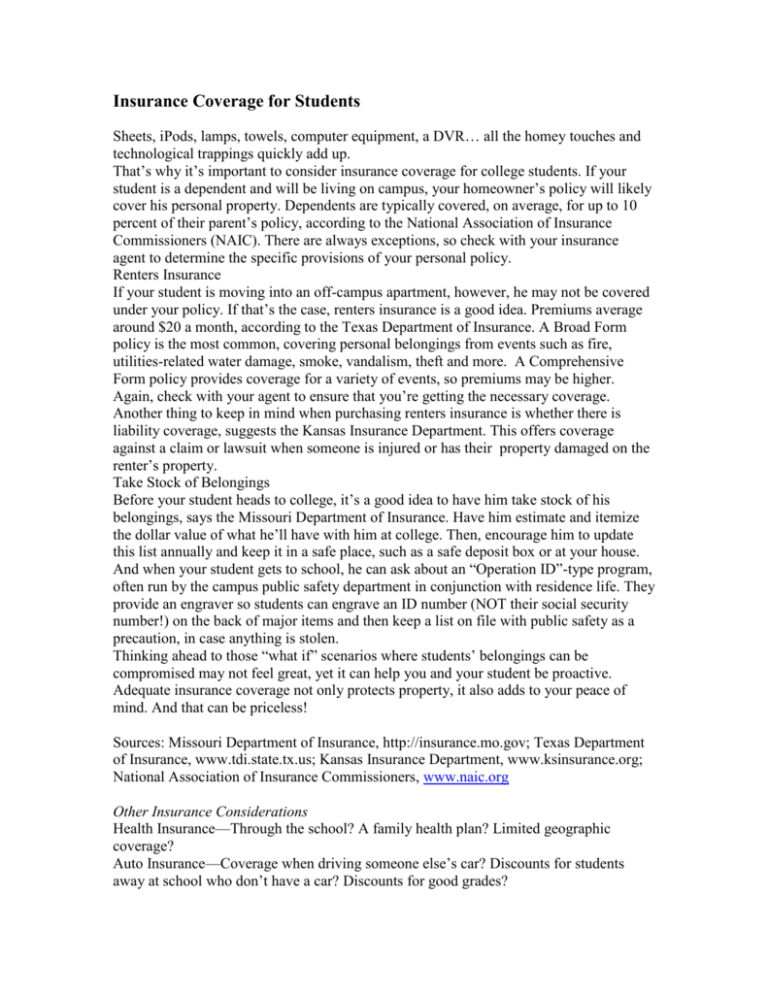
Insurance Coverage for Students Sheets, iPods, lamps, towels, computer equipment, a DVR… all the homey touches and technological trappings quickly add up. That’s why it’s important to consider insurance coverage for college students. If your student is a dependent and will be living on campus, your homeowner’s policy will likely cover his personal property. Dependents are typically covered, on average, for up to 10 percent of their parent’s policy, according to the National Association of Insurance Commissioners (NAIC). There are always exceptions, so check with your insurance agent to determine the specific provisions of your personal policy. Renters Insurance If your student is moving into an off-campus apartment, however, he may not be covered under your policy. If that’s the case, renters insurance is a good idea. Premiums average around $20 a month, according to the Texas Department of Insurance. A Broad Form policy is the most common, covering personal belongings from events such as fire, utilities-related water damage, smoke, vandalism, theft and more. A Comprehensive Form policy provides coverage for a variety of events, so premiums may be higher. Again, check with your agent to ensure that you’re getting the necessary coverage. Another thing to keep in mind when purchasing renters insurance is whether there is liability coverage, suggests the Kansas Insurance Department. This offers coverage against a claim or lawsuit when someone is injured or has their property damaged on the renter’s property. Take Stock of Belongings Before your student heads to college, it’s a good idea to have him take stock of his belongings, says the Missouri Department of Insurance. Have him estimate and itemize the dollar value of what he’ll have with him at college. Then, encourage him to update this list annually and keep it in a safe place, such as a safe deposit box or at your house. And when your student gets to school, he can ask about an “Operation ID”-type program, often run by the campus public safety department in conjunction with residence life. They provide an engraver so students can engrave an ID number (NOT their social security number!) on the back of major items and then keep a list on file with public safety as a precaution, in case anything is stolen. Thinking ahead to those “what if” scenarios where students’ belongings can be compromised may not feel great, yet it can help you and your student be proactive. Adequate insurance coverage not only protects property, it also adds to your peace of mind. And that can be priceless! Sources: Missouri Department of Insurance, http://insurance.mo.gov; Texas Department of Insurance, www.tdi.state.tx.us; Kansas Insurance Department, www.ksinsurance.org; National Association of Insurance Commissioners, www.naic.org Other Insurance Considerations Health Insurance—Through the school? A family health plan? Limited geographic coverage? Auto Insurance—Coverage when driving someone else’s car? Discounts for students away at school who don’t have a car? Discounts for good grades? Seasonal Student Issues There’s a seasonal ebb and flow when it comes to student issues. Here are a few things your student may be experiencing this month: √ Missing friends at school and feeling like it’ll be a long time until they see them again √ Transitioning back to life at home after being away all year (for students who go away to school) √ Adjusting to a new routine √ Working full-time instead of going to school full-time √ Anxiety about academics – feeling like they have a lot of ground to make up if they did poorly last semester √ Reestablishing relationships with siblings, parents and friends √ Budgeting their money and saving for fall Although the immediate frenzy caused by H1N1 flu, or the “swine flu,” has ceased, there is still reason for concern, according to the Centers for Disease Control. The population has little to no immunity to this virus and the CDC anticipates that illnesses may continue for some time. However, campuses and communities are responding aggressively to the outbreak, through education campaigns, thoroughly cleaning public spaces and more. Public health advice encourages people to employ social distancing measures to halt the spread of H1N1, meaning that they should avoid crowds when ill by staying home for seven days after the onset of flu-like symptoms or until they’ve been symptom-free for 24 hours, whichever is longer. Warning Signs Some of the symptoms associated with the H1N1 flu are similar to seasonal flu: fever, cough, sore throat, runny or stuffy nose, body aches, headache, chills and fatigue. Others also report diarrhea and vomiting. Emergency warning signs in adults that require urgent medical attention include: • Difficulty breathing or shortness of breath • Pain or pressure in the chest or abdomen • Sudden dizziness • Confusion • Severe or persistent vomiting • Flu-like symptoms improve but then return with fever and worse cough Emergency warning signs in children that require urgent medical attention include: • Fast breathing or trouble breathing • Bluish or gray skin color • Not drinking enough fluids • Severe or persistent vomiting • Not waking up or not interacting • Being so irritable that the child does not want to be held • Flu-like symptoms improve but then return with fever and worse cough If you have questions about the campus H1N1 response and plan, contact health services. We’re working to keep students safe and healthy—and teaching them how to keep themselves healthy, too. Facts & Figures Worldwide, as of mid-May, 39 countries had reported 8,480 cases of H1N1 infection, with 66 deaths in Mexico, four in the U.S., one each in Canada and Costa Rica. Over 4,700 cases of H1N1 flu have been reported in the U.S. and 496 have been confirmed in Canada. Steer Clear √ Cover your nose and mouth with a tissue when you cough or sneeze √ Throw that tissue in the trash right away √ Wash your hands often with soap and water, especially after coughing or sneezing √ Or use alcohol-based hand cleaners √ Avoid touching your eyes, nose or mouth, since germs spread this way √ Try to avoid close contact with sick people Summer Money Conversations This regular column will address financial issues as we all contend with today’s shaky economy. Textbooks, tuition, housing… As you and your student plan ahead for the upcoming academic year, some questions can help you get on the same page when it comes to key money topics: • What are the “big ticket” items to consider when budgeting? Consider things like tuition, room, board, etc. • How much will travel cost this year? Consider gas and insurance costs, the estimated number of weekends residential students will travel home or elsewhere, if the student is job searching this year and needing to go on interviews, etc. • What money will be coming in? Consider scholarships, grants, work-study and other jobs. • What are the estimated costs for those “little things” that can quickly add up? Consider laundry, school supplies, entertainment, conference attendance, postage, clothing, toiletries, parking fees, equipment costs and more. • Where can you cut back this year? Consider riding a bike and using public transportation instead of having a car, vowing to order out only once a month, etc. By talking about things now, you and your student can be on the same money page once the upcoming academic year arrives. How to Make the Most of Your Orientation Experience There is information to gather and questions to ask! Make the most of your opportunity to go through a parent and family orientation program by doing the following… Prepare Questions. Think about what you really want to know, not just what you “should” find out. Interested in how students can apply their learning in practical settings? Ask about internships, jobs and co-op opportunities. Want to know whom your student can turn to if he’s having learning difficulties? Ask the question. Thinking ahead will help you determine what’s truly important to you and your student. Don’t be Shy. Sitting back and listening to presenters and panels makes good sense. However, if you have additional questions, don’t hesitate to ask. Whether it’s in a group setting or one-on-one after a presentation, your concerns deserve attention. And no question is a “dumb” one! Listen and Take Notes. Jot some notes as various presenters offer you information. That way, you can read through them when you get home and clear your head. It’s easy to say, “I’ll remember that point or that contact info” yet the sheer volume of information you are offered during orientation makes remembering everything very difficult. Get to Know Other Parents/Family Members. Orientation is an excellent time to mix and mingle with others who are going through the same thing that you are: sending your student to college. Develop informal support structures and compare notes with other parents and family members. Give Your Student Some Space. This is his first campus experience as a matriculated student, so it’s important that he learn to navigate on his own. Give him space to meet people, to ask his own questions and to take charge of his college life. Starting off with a dose of self-responsibility during orientation will set a positive tone for the rest of his time on campus. Take Tours. It may be hot and you may be tired. Yet nothing beats seeing something with your own eyes. So, consider taking tours that are offered. You’ll get to see academic buildings, residence halls, community spaces and much more. Then, when your student starts talking about these places during the semester, you’ll be able to accurately picture her in her surroundings. Keep Yourself Healthy. Orientation sessions often happen on some of the hottest days of the year. Drink water, stay cool and pace yourself. Don’t Cause a Scene. We all know how to handle concerns with care and dignity. Make that your mode of operation so that people will respond to you better and so that your student doesn’t have to be embarrassed. Have Paperwork in Place. Work with your student to make sure that you’re bringing all the required paperwork to campus for orientation. Go through a checklist ahead of time so that you both feel prepared to dive into orientation without worry! Volunteer to Help. Why not? You may be called upon for career assistance, planning Parents/Family Weekend events and more. This connection to campus can be invaluable, especially when you have questions, concerns and ideas. Orientation can be an exciting time for both you and your student. Make the most of it! Questions to Consider Academics. What services are available to students with learning disabilities? How do professors’ office hours work? If a student is feeling behind, what can he/she do? Commuter Concerns. What meal plans are available for commuters? How can they get involved in campus life, even thought they don’t live there? What is the parking situation like? Residence Hall Life. What are students allowed to bring and what is against policy? Do the mattresses require extra long sheets? What staff members are available in the halls? This is just the tip of the iceberg. Determine what is important for you and your student to know. Is Your Student in Mourning? Recognizing the Stages of Grief There are many things that students may be mourning during their college years: the end of a significant relationship, the death of a close family member or friend, a parental divorce, separating from an organization or activity that was a big part of her life and more. You may be noticing some of this as your returning student mourns the loss of her lifestyle and relationships that she experienced at school, now that she’s home for the summer. Or your new student may be starting to mourn the loss of her friendships— and comfort zone—at home as she prepares to head to college in the fall. Understanding the stages of grief that students will likely experience can help you be there for them while also pointing them toward campus counselors who can provide additional assistance. Here’s what to look out for, as many people go through the five stages of grief, in their own way and on their own time. They include: 1. Denial—Denying or refusing to believe that the incident or event happened. 2. Anger—Feelings of frustration, agitation and anger, which can sometimes lead to blaming others (even those not necessarily responsible) or the desire to “get even.” 3. Bargaining—Better known as guilt. In fact, individuals experiencing this stage often blame and burden themselves with feelings of excessive amounts of guilt and/or regret. 4. Depression—During this stage, individuals may experience a lapse in routine, trouble sleeping, and/or feelings of “numbness” or sadness. 5. Acceptance—Admitting the incident occurred and accepting the reality of the situation. Summer Conversation Topics Sometimes all it takes is a simple starter to get some good, meaningful conversation going. So, consider asking… • What classes your student is most looking forward to next term— and why • How he’s thinking about arranging his living space to make it more fun and effective • The thing(s) she’s glad she got involved in this year—and why • Goals for next term, from applying for a campus job to an academic goal to trying out for a leadership position • Ways you can both be more environmentally conscious • What classes you’d like to take if you were in college—and why • The faculty or staff member your student was most inspired by—and why • How his friends are spending the summer • What she’d suggest to family or friends going to college, now that she has some experience under her belt • Places around school that he’d like to explore, from apple orchards to hiking trails • What he’s really looking forward to in the coming year These topics not only give you an opportunity to connect with your student, they also help her reflect on experiences gained and goals for the coming term.


